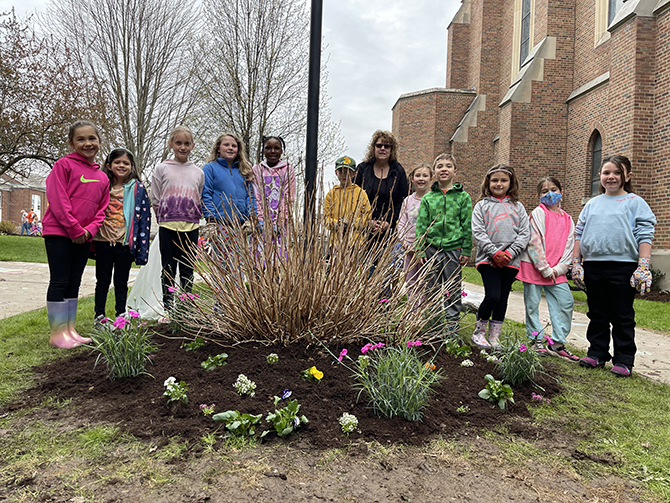By Eileen Jevis | Staff Writer
In the April 28 issue of The Catholic Sun, Andrea Slaven, M.Ed., M.A., director of Catechesis for the Diocese of Syracuse, wrote what was the first of a four-article series focusing on the Office of Catechesis and the different models and aspects of catechetical instruction in our diocese. With First Communion ceremonies taking place throughout the diocese this spring, we will look at the Sacrament of the Eucharist—one of the seven signs of grace instituted by Christ and entrusted to the Church.
Eucharist preparation is a family affair.
The Sacramental Guidelines compiled in 2016 by the Syracuse Diocese call on parents, catechetical leaders, catechists and pastors to help children know God as the creator and loving parent, Jesus as God’s son, and the Holy Spirit as the giver of gifts who helps us to share our knowledge of the life, death and resurrection of Jesus. Communion candidates should have the ability to distinguish between consecrated bread and ordinary bread and to recognize that Jesus is present in the Eucharist in a special way.
Elizabeth Brown and her family are parishioners of Holy Cross Church in DeWitt. Elizabeth is one of approximately 1,420 children in the Diocese receiving the Eucharist for the first time. The Browns have embraced these teachings by ensuring that their 8-year-old daughter is well prepared and understands what the sacrament is all about. “Elizabeth has learned a lot about the body and blood of Christ and that we are receiving him when she takes Holy Communion,” said Brenna Brown.
Brown said the dedicated staff at Holy Cross has ensured the children are having fun while they are learning the material. They made chalices and hosts out of clay that are now on display in the gathering area at the church. “Last year, when the children couldn’t meet for religious education due to the pandemic, the staff put together boxes that were delivered to each home. Inside were lessons, treats for the kids and instructions for the parents,” explained Brown. “The learning materials that were provided to us at home allowed us to continue Elizabeth’s instruction with no interruption. It’s another example of the commitment the staff has to teaching our children about this very special sacrament.”
The Eucharist: Encountering Christ
The Sacramental Guidelines state that from the beginning, the Christian community has experienced the Eucharist as an encounter with the Risen Lord Jesus. From the beginning, the Christians have proclaimed that Jesus is truly and really present in the Sacrament of the Eucharist. “In Luke’s Gospel, when Jesus gathered his disciples for the last supper, he said to them, ‘I have longed to share this meal with you before I suffer’” (Luke 22:15).
Sister Katie Eiffe, CSJ, vicar for religious and director of synodal planning for the diocese, said that since Vatican II, sacramental preparation has moved from an almost exclusive knowledge-based method (an intellectual approach) to a relationship and experiential approach that places emphasis on sacraments as “encounters with Christ.”
“It is important to know what we believe, but it is equally important that we understand that all of the sacraments are moments of an encounter with the God who loves us unconditionally, who forgives everything, and who gifts us all with all that we are and all that we have,” explained Sister Katie.
Preparation is being present
Terry Piazza-Panuccio is the associate director of catechesis for grades K-6 and director of faith formation at St. Mary of Mount Carmel/Blessed Sacrament Parish in Utica. Like Sister Katie, Piazza-Panuccio embraces the practice of First Communion preparation being more than just knowledge-based. “I don’t think our faith is a test, but rather a relationship,” she said.
Piazza-Panuccio is involved in teaching the children at St. Mary of Mount Carmel/Blessed Sacrament, so she knows firsthand what they are learning and understanding. “I practice having the children receive the unconsecrated host each week prior to their two First Communion practices. This really helps them learn to be reverent when they receive the sacrament. They truly know who they are receiving.”
Piazza-Panuccio said that during one of the lessons, the children reenact the Last Supper. “We just celebrated the holiest week in our Church. On Holy Thursday, we were given the gift of Christ himself in the Eucharist. On that holy night, Christ commanded us to “Take and Eat, Take and Drink …”
Family members in the Diocese are encouraged to bring their Communion candidates to Mass each Sunday to witness the consecration of the host and further their understanding of the Eucharist. At Holy Cross Church Communion candidate Elizabeth attends Mass with her parents each week and is now familiar with the different areas of the church—the altar, chapel, tabernacle and confessional. She was very excited to have made her First Communion on May 1. “Church will be more exciting now that I can receive Communion each week,” she said. “I will be able to receive the host and not just get a blessing.”
John and Jean Reale are Eucharistic ministers at St. Mary of Mount Carmel/Blessed Sacrament as well as parents of Communion candidate Christopher. They attend Mass every Sunday to reinforce what their son is learning in class and at home. “He needs to see week after week what is happening in Mass and how important the Eucharist is,” said John Reale.
Reale said that learning their faith is a journey throughout their lifetime. “When we look back on our own First Communions many years ago, we remember how special that day was and how happy and proud our families were to celebrate this faith journey milestone. We are fortunate to be able to share this blessed sacrament with our son.”
“Very often, parents who take part in the preparation process with their children come to a deeper understanding of the Eucharist in their life,” added Sister Katie. “In the past, there was little emphasis on the gift of the Eucharist.” She said that for many years, and due in large part to the call of Vatican II to renew our understanding of the sacrament, preparation for First Communion has included a focus on the Eucharist as a precursor of the heavenly banquet. “Jesus institutes the Eucharist at a meal with his closest disciples and friends. Such an approach, that includes families, connects the Eucharist to the human experience of breaking bread; of sharing a meal with those whom we love and who love us.”
Faith formation: a lifelong process
The mission of the diocese is to educate, evangelize and empower others through lifelong and ongoing faith formation. In Bishop Douglas J. Lucia’s 2021 pastoral letter, he talked about the importance of faith and service in the community. “We have already seen that faith and works are intimately connected and without both, the Church is dead!” he wrote. Bishop Lucia stated that to best serve the people of the diocese, it is most important to come together even more in charitable outreach and advocacy. Families throughout the diocese put their faith into action. First Communion candidates participate in community service programs that enhance their understanding of knowing and living their Catholic faith.
At Blessed Sacrament Church in Syracuse, First Communion candidates prepared and rejuvenated the Catechist Garden. The garden represents and remembers the many catechists who have shared their faith over the years at Blessed Sacrament.
Holy Cross Church hosted a baby shower for the Syracuse Refugee Assistance Program through Catholic Charities and encouraged families to donate baby items and gift cards. It was an opportunity for Communion candidates to witness the importance of giving to those in need.
Patricia D’Angelo is the faith formation director at Holy Family Church in Syracuse. She said that all their faith formation families participate in service projects, including those making their First Eucharist. The parish ran a collection drive to gather dental supplies. “Families gathered to decorate 500 bags and assemble the kits that were donated to the Samaritan Center and Amaus Dental Clinic,” explained D’Angelo. When the bags were filled, the extra supplies were donated to Catholic Charities. “The families were really excited to have the opportunity to come together and be a part of the project, said D’Angelo. “There was so much energy and enthusiasm in the room. Being a part of something bigger than themselves is so meaningful and important.”
These are just a few examples of families across the diocese putting their faith into action and teaching children at a young age that God works through all of us.
“Discipleship is a way of life—living as Jesus taught us to live, loving as Jesus taught us to love, and offering the gift of ourselves to others,” said Sister Katie. Discipleship is a lifelong journey.”







